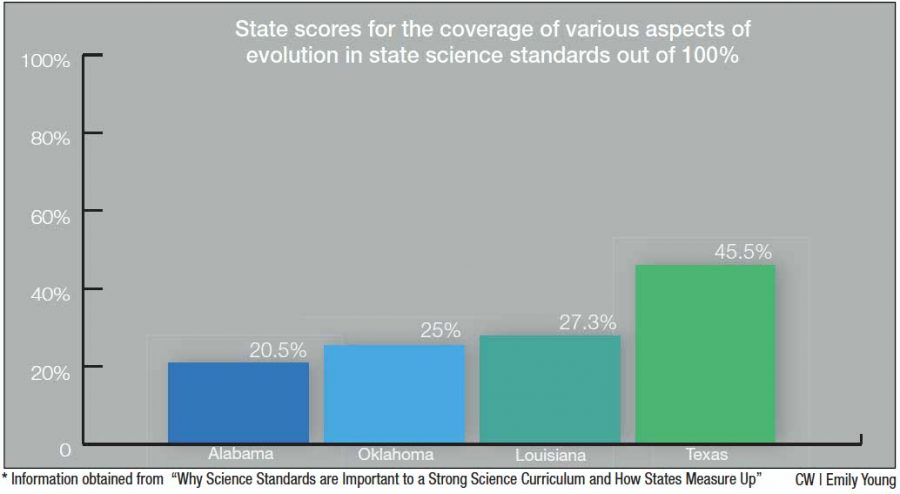Taylor Burbach, a junior majoring in anthropology, said she was not taught anything about evolution while in high school. It was in her textbook, but when it came time to cover that section, her teacher told her it would not be a part of the class. Burbach, a Birmingham native, is not alone.
Christopher Lynn is a University of Alabama professor in the anthropology department and co-director of the evolutionary studies program, which is a minor and club that studies evolution across multiple disciplines. He said many students across the state are left at a disadvantage when teachers and schools choose to exclude evolution from the curriculum.
“Alabama doesn’t do so well at teaching evolutionary principles at the K-12 level for a variety of reasons – the big one is cultural. Another one is simply a lack of science standards at the state level for it,” Lynn said.
According to a 2009 survey, Alabama ranked last in evolution education practices.
“It behooves us to give [the students] a better, more well-rounded education,” Lynn said.
It is because of statistics like this and students like Burbach, who is now head of outreach for the evolutionary studies club, that the evolutionary studies program is making a concerted effort to promote evolution education in K-12 schools across Alabama.
The program is a combination of the evolutionary studies minor and the evolutionary studies club. The minor pulls from a variety of fields, including anthropology, biology, philosophy and history. The club is made up of students from a variety of majors and is open to anyone.
“By providing an interdisciplinary program that offers more exposure, folks will be educated, and more educated in their criticism if they have criticism, or know what they are talking about when it comes up,” Lynn said.
The club is currently in the midst of a fundraiser to help raise money for outreach and promotion. The money raised will go toward creating visual awareness on campus and starting a conversation among students.
“I think the problem with getting people to believe evolutionary theory is they just don’t understand it,” Sophia Fazal, a member of the evolutionary studies club, said.
The club has a variety of events and speakers set up for the spring semester. Alabama Lectures on Life’s Evolution, known as ALLELE, works in conjunction with the evolutionary studies club. There are four ALLELE speakers set to be featured in the spring. Additionally, the club will host the Darwin Days Colloquium in February in honor of Charles Darwin’s birthday. Lynn described Darwin Days as “essentially a nerdy conference.”
As part of its outreach efforts, the club hopes to raise enough funds to extend an invitation for K-12 students to attend the Darwin Days event and perhaps even defray some of the cost of the students attending.
Students interested in learning more about the program are encouraged to speak with Lynn or Leslie Rissler, the co-directors of the program. All students are welcome to join the club at any point throughout the school year. There are no dues or requirements for membership besides an interest in promoting and advocating for evolution education and a desire to learn more about evolutionary studies, members said.
Additional club and minor information can be found by visiting the evolutionary studies website, as.ua.edu/evolutionarystudies.









